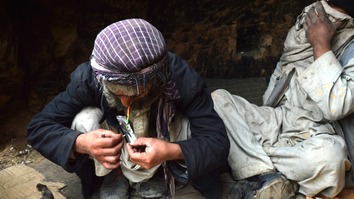MAZAR-E-SHARIF -- Thousands of young residents of Balkh have turned to illegal drugs as a result of growing poverty, unemployment and uncertainty, say local officials.
"It has been two years since I have had a job. My children wanted food, and I could not provide for them; I was going crazy. Someone advised me to use opium as it calms the mind, but now I cannot live without opium," said Shamsuddin, 47, a resident of Mazar-e-Sharif who has a wife and four children.
Estranged from his family, Shamsuddin now sleeps in a cemetery in Dasht-e-Shoor, north of the city.
"I had a good family, but I lost everything. I don't know what to do," he said.
Ali Ahmad Qayoumi, 36, a graduate of the Agriculture School of Balkh University, is now addicted to heroin too.
"I fled the country two years ago and went to Iran in search of work. I worked there for four months, hiding from the Iranian police, but they caught me and imprisoned me for illegally entering Iran," he told Salaam Times on May 14.
"I spent four months in detention, suffering oppression and torture. Then they deported me," Qayoumi said.
"I became addicted to heroin in Iran, and could not quit drugs when I returned to my country because of unemployment," he said, adding that he would try anything to find money and buy heroin.
Provision of treatment
Najibullah Tawana, the director of the Balkh Department of Health, said that his organisation has provided periodic treatment for about 10,000 addicts and raised awareness of the dangers of drugs for about 20,000.
"We have treated thousands of drug addicts in 45-day cycles across 12 drug addiction treatment camps," he said. "This process will go on until all drug addicts are treated."
"In co-operation with the municipality and the Balkh Department of Work and Social Affairs, we have been discussing work opportunities [for former addicts] ... so that they do not relapse," he added.
"I went to Iran as a migrant labourer and got addicted to heroin there along with others," Rahimullah Noori, 29, a resident of Mazar-e-Sharif city, told Salaam Times.
"When I returned home, I realised that my life at home was difficult as well. I then started stealing here and there in the city to find money to buy heroin," he said.
"I was embarrassing my family, but now I am happy that I have been treated and feel at peace," Noori said.
A major problem
About 90,000 Afghans, including children and women, are addicted to drugs in the province, Juma Khan Rasikh, the director of counter-narcotics at Balkh Police Headquarters, told Salaam Times.
"Fortunately, we were able to treat more than 10,000 addicts last year for free through our health units and send them back to their homes," he said.
"Written commitments have been secured from the treated addicts that if they relapse, they will be prosecuted. They have pledged to serve their country and people," Rasikh said.
About 264 individuals were arrested last year in connection with charges of selling and trafficking drugs in different parts of the province, according to Rasikh.
Drug addiction is "a major social problem that stems from poverty, unemployment, economic problems, violence and insecurity", said Abdul Raouf Samadi, 56, a sociologist in Kunduz province.
"Unfortunately, thousands of our youths have been addicted to drugs because of these factors in recent years," he said. "When they need money, they end up committing murder, kidnapping, prostitution and other crimes."
"If employment is provided for the youth in the country, not only will the level of addiction decrease, but with each passing day they will serve their society and people," Samadi said.

![Afghan addicts smoke opium in Pul-e-Khumri, Baghlan province, on December 24. [AFP]](/cnmi_st/images/2023/05/22/42219-33637cc-highres-585_329.jpg)







Due to the high number of unemployment, Afghan youths are forced to start smuggling drugs and find a piece of bread for themselves. Most of our youths who traffic drugs, got addicted to smoking drugs, which ruined their life. All these miseries are caused by the wars in Afghanistan. Afghan high ranking officials have never worked for their people. All their actions were for their own benefits, and now the youth of the poor nation has fallen into this situation. In Afghanistan, there is no job for an educated person who has a diploma or a master's degree. There is no work for a labor worker. So, he becomes addicted to drugs while he is sitting idle at home. We request the current government to treat addiction patients, and create a work environment for the young Afghans, so that they won't get addicted anymore.
Reply2 Comment
There is no doubt that unemployment and poverty lead to using drugs. Some issues in society will force you to face drugs. In the beginning, one thinks that using drugs will make him forget about his concerns, but later on, he will face a headache which will cause his life to be filled with suffering, and he will get away from his family and relatives. People look down on him. Everyone is distancing themselves from him. They do not call him by his name. They mention him as Charsi [Hashish smoker], Powderi [Heroin user], Cigarette smoker... If the same drug addict has a wife and children, they will suffer from problems because of this person and have a bad life. We hope job opportunities will be created for the people—opportunities to take advantage of constantly. Children should be educated, and adults should work. Because I know children who have not yet understood life in its true sense, but because of lack of a plan, they do not have a job, and they get addicted to drugs, and even their kids get addicted...
Reply2 Comment